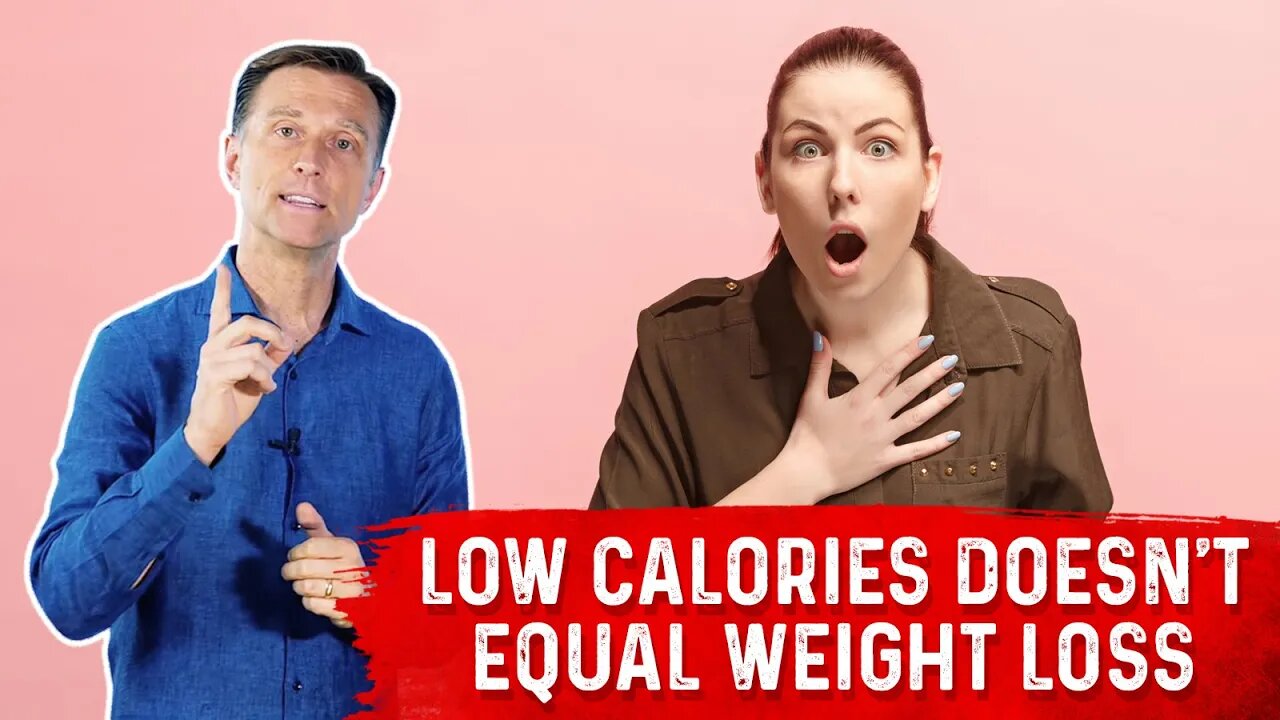Premium Only Content

Calorie Myth – Why Low Calories Does Not Equal Weight Loss – Dr.Berg
What are calories? Why don't low calories diets always cause weight loss? Find out this video.
Timestamps:
0:00 What are calories
0:48 The 3 macronutrients
2:00 Triggering the fat-burn hormones with protein
3:35 The ketogenic diet
5:42 Types of carbs
7:10 Which calories are best
In this video, I want to talk to you about calories.
A calorie is a unit of energy in food. Each type of food (carbohydrates, proteins, and fats) has its own unit of energy.
• Protein contains 4 calories per gram
• Carbohydrates contain 4 calories per gram
• Fat contains 9 calories per gram
You can see that fat contains more than double the calories per weight. The assumption is that consuming fat, which contains more calories, will cause more weight gain. But what is rarely factored into this equation is the hormone piece of the puzzle.
Insulin is the most powerful "fat-making hormone." It will convert food into fat easily. It is triggered by:
• Sugar Carbohydrates (including grain carbs, fruit juice, and starchy carbs (potato, rice, and corn).
• Excess protein.
Interestingly, fats are neutral and are not triggered by any of the fat-storing hormones.
Growth Hormone (GH) is the most powerful "fat-burning hormone." It will trigger the fat-burning process. It is triggered by protein (small amounts).
Why?
To understand this more, we need to look at the purpose of these foods.
1. Protein
Protein is needed to repair and replace many body structures (muscles, tendons, collagen, hair, nails, hormones, etc.). We continuously need protein to restore the body tissue. So our body needs a certain amount of protein, and this is why only excess protein is converted to fat. 3-4 ounces of protein is best.
2. Fat
Fat is needed to repair and replace many body structures (the outer walls of all cells, mini-structures inside our cells, our entire nervous system, our entire skin, our brain, and our hormones). The ketogenic diet focuses primarily on fats to use as fuel.
3. Carbs
Sugar carbs, including grains, starches, and sweet fruits, are what really lead to weight gain. Vegetable carbs—most vegetables do not turn into sugars easily, which don't contribute to weight gain.
Dr. Eric Berg DC Bio:
Dr. Berg, age 57, is a chiropractor who specializes in Healthy Ketosis & Intermittent Fasting. He is the author of the best-selling book The Healthy Keto Plan, and is the Director of Dr. Berg Nutritionals. He no longer practices, but focuses on health education through social media.
Follow Me On Social Media:
Facebook: https://bit.ly/FB-DrBerg
Instagram: https://bit.ly/IG-DrBerg
Anchor: https://bit.ly/Anchor-DrBerg
TikTok: https://bit.ly/TikTok-DrBerg
Send a Message to his team: https://m.me/DrEricBerg
ABOUT DR. BERG: https://www.drberg.com/dr-eric-berg/bio
Disclaimer:
Dr. Eric Berg received his Doctor of Chiropractic degree from Palmer College of Chiropractic in 1988. His use of “doctor” or “Dr.” in relation to himself solely refers to that degree. Dr. Berg is a licensed chiropractor in Virginia, California, and Louisiana, but he no longer practices chiropractic in any state and does not see patients so he can focus on educating people as a full time activity, yet he maintains an active license. This video is for general informational purposes only. It should not be used to self-diagnose and it is not a substitute for a medical exam, cure, treatment, diagnosis, and prescription or recommendation. It does not create a doctor-patient relationship between Dr. Berg and you. You should not make any change in your health regimen or diet before first consulting a physician and obtaining a medical exam, diagnosis, and recommendation. Always seek the advice of a physician or other qualified health provider with any questions you may have regarding a medical condition.
#keto #ketodiet #weightloss #ketosis
Thanks for watching. I hope this video helped clear up the confusion about calories and weight loss.
-
 7:11
7:11
Dr. Eric Berg
4 days agoWhy Your Vitamins Are Not Working
6.23K13 -
 LIVE
LIVE
The Jimmy Dore Show
23 minutes agoMedia ADMITS They Lied About Biden’s Decline! SNL Audience CHEERS For Luigi Mangione!
4,297 watching -
 LIVE
LIVE
Robert Gouveia
2 hours agoMatt Gaetz REJECTS Report, Sues Committee; Luigi Fan Club Arrives; Biden Commutes; Festivus Waste
2,868 watching -
 58:10
58:10
Kimberly Guilfoyle
3 hours agoAmerica is Back & The Future is Bright: A Year in Review | Ep. 183
15.2K14 -
 3:03:27
3:03:27
vivafrei
9 hours agoEp. 242: Barnes is BACK AGAIN! Trump, Fani, J6, RFK, Chip Roy, USS Liberty AND MORE! Viva & Barnes
52.8K21 -
 LIVE
LIVE
Dr Disrespect
7 hours ago🔴LIVE - DR DISRESPECT - MARVEL RIVALS - GOLD VANGUARD
3,574 watching -
 1:15:00
1:15:00
Awaken With JP
5 hours agoMerry Christmas NOT Happy Holidays! Special - LIES Ep 71
75.8K83 -
 1:42:21
1:42:21
The Quartering
7 hours agoTrump To INVADE Mexico, Take Back Panama Canal Too! NYC Human Torch & Matt Gaetz Report Drops!
61.6K43 -
 2:23:15
2:23:15
Nerdrotic
6 hours ago $8.26 earnedA Very Merry Christmas | FNT Square Up - Nerdrotic Nooner 453
42.9K4 -
 1:14:05
1:14:05
Tucker Carlson
6 hours ago“I’ll Win With or Without You,” Teamsters Union President Reveals Kamala Harris’s Famous Last Words
122K269